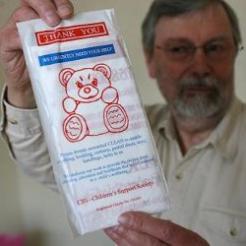The Charity Retail Association discussed how to improve enforcement around charity bag crime, suggesting that charities themselves could be more systematic in obtaining intelligence and informing the authorities, at a summit yesterday.
Research by the CRA has found that only 18 per cent of donated stock came from doorstep collections in the last year, a figure that was 52 per cent in 2008. It says that this drop means that charities are losing over £50m annually, brought about largely by an increase in bogus collections.
The summit was called to address this problem, and was attended by minister for crime prevention Jeremy Browne, as well as representatives from the Serious and Organised Crime Agency (SOCA), UK Border Agency, Association of Chief Police Officers (ACPO), HM Revenue and Customs, the National Fraud Intelligence Bureau, and the Home Office.
Collecting systematic evidence
One of the points discussed at the summit was how charities themselves can play a big part in combatting collection crime.
“The charity sector needs to ensure that it is gathering intelligence systematically where possible and feeding this into the enforcement agencies,” a spokeswoman from CRA told civilsociety.co.uk.
“The sector on the whole is making great steps towards tackling the problem, as demonstrated at this really positive summit.
"Though we have quite a lot of information from the National Fraud Intelligence Bureau, we need to ensure we have all the intelligence possible. We are looking at whether we can work through the National Business Crime Solution which is about data sharing of crime across retail and business.”
Police forces sharing information and intelligence was identified as a problem at the summit, the spokeswoman continued, although she added that while results vary across different areas, some police forces do a great job.
“This is something we hope that ACPO can help us with but we also need to think about how we communicate with local police forces – and we hope the PCC campaign [see below] may help with this,” she said.
Joint operation run by one body
Attendees at the meeting also emphasised the need for joint operations co-ordinated across different enforcement agencies, given that the criminality associated with these gangs is quite complex.
This includes financial fraud and money laundering, trafficking, theft and fraud on a local level – and in some instances violence and disputes over territory leading to violence.
“But there is also the need for one body to coordinate and lead the activity – part of what we are speaking with SOCA about,” the spokeswoman added.
CRA is to meet again separately with SOCA and the National Crime Agency to explore how it can take the campaign forward with them helping to disrupt the organised criminal activity.
The Association is also working with the ACPO National Business Crime Forum to look at intelligence gaps and try and improve communication with police forces
CRA chief executive Warren Alexander said about the summit: “We were pleased to have such excellent representation from the different enforcement agencies around the table, and were delighted to have the minister’s support for this piece of work.
“The meeting represented a huge step forward in terms of working together across the charity sector and enforcement bodies.
"We hope this will lead to a strong partnership aimed at disrupting the organised gangs involved in this activity, who are not only costing the charity sector an estimated £50m every year through theft, but also committing other really serious crime including assault and violence, trafficking and forced labour, and financial fraud.”
Stop Charity Bag Crime campaign
The summit coincided with CRA’s Stop Charity Bag Crime campaign, launched yesterday and aimed at candidates for the upcoming Police & Crime Commissioner (PCC) Elections.
The CRA is asking PCC candidates to make three pledges before the elections on 15 November, to help it move towards stamping out the UK’s charity bag crime.
“We want the public to have confidence that when they give clothing to a charity collection bag posted through their door, the profits go to a good cause,” the CRA said.
The Association wishes to raise awareness among police forces about bag crime, strengthen what it describes as a ‘variable’ standard of response by them, and ensure they are sending a signal to bogus collectors that their activity will not be tolerated.
Warren Alexander said that not enough people are checking bags to make sure they are from authentic charities.
“House-to-house donations to charity shops are at an all-time low,” he said. “There is more than one reason for this, including more competition from businesses which sell clothing for profit, but the increase in bogus collections is one of the key factors.
“And as only around 1 in 7 of us actually check on the bag to see that it’s from a genuine charity, it’s no surprise that these gangs are taking advantage of the generosity of households.
“We want all PCC candidates to sign up to our pledge so we can ensure that all police forces are aware of this problem.”










